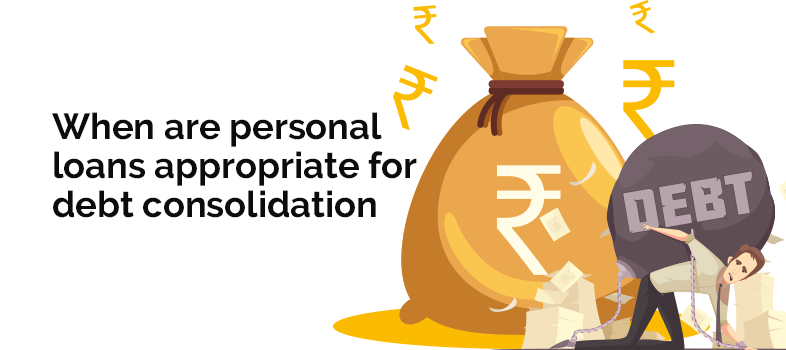When you have many existing debts, a personal loan can come to your rescue. A personal loan for debt consolidation can not only lower your interest rate but also help to make payments on time. However, this is not a long term solution.
In the last few years, personal loans are becoming quite common and are put to use for big & small payments, including debt consolidation.
Using a personal loan to pay off high interest debt is a good plan to think of. This is not that easy as it may sound to you. Timely repayments are just as big as it may sound when we shift from credit cards to typical loans.
So, if you’re still devising ways, then a personal loan can effectively help your spending and debt issues.
Below highlighted are the pointers to be considered before a deep dive:
You have a plan to pay off your debt
Before reaching a decision, it’s relevant to understand that you want to pay back debt. Next is the plan to pay off your debt on timely basis. If you land up with a huge debt and do not care about paybacks, then you may not even feel worried.
Is the new monthly payment feasible?
Are you finding it difficult to pay up? Or are you trying take on more cards for repayment? Nothing helps substantially like your own willpower & courage. Being dishonest to your oneself can lead to greater amount of pressure & false hope.
“Your borrowings could be considerable but not unmanageable.”
Personal loan can be used for debt consolidation in case of adequate amount of debt. Think if you’ll be able to pay off at the earliest, maybe in 5 next years, then a consolidation act makes sense.
However, do not plan to make EMI payments within 6 months. This is the shortest keeping in view the huge interest components with it. The small amount wouldn’t be worthwhile for a long short.
On the other hand, if you have no idea how you’ll ever pay off your debt, much less in the next five years, then a personal loan is likely not enough for you. You probably need to seek out credit counseling—a professional who will set your affairs in order.
You’ve got your Spending under Control
Consolidating your credit card debt with a personal loan doesn’t magically make that debt disappear—it just moves it around. The debt, after all, is the symptom; living beyond your means is the disease. If you know that the only reason you aren’t still charging stuff to your maxed-out credit cards is that they’re maxed out, then a personal loan may be the ultimate enabler—getting you out of your current crunch but doing nothing to stop your excess spending.
If you’ve had a come-to-Jesus moment about your spending, then a personal loan may be a useful way to simplify and streamline your debt repayment. But if you haven’t, it’s just a new way to get more into debt.
Your Credit Score is high Enough to Snag low rates
If your debt has done a number on your credit score, then the personal loans available to you may or may not be cheaper than continuing to pay down your credit cards. The FICO score requirements for the best rates at personal loan lenders can be steep. You might need a credit score over 760 to start seeing the lowest, single-digit interest rates.
If you’ve got high balances but always pay at least the minimum on time, then your credit score is probably high enough to get a lower rate than your credit cards. But if you’ve missed payments regularly, it probably makes a personal loan nothing more than a lateral move in terms of your monthly interest payments. Fortunately, some personal loan lenders like Credible let you check your interest rate before you apply and without hurting your credit with rates starting at 5.95% APR (with autopay)*.
Even if you can’t beat your existing interest rate by consolidating debt with a personal loan, there may be an advantage: With a personal loan, you’ll need to make a fixed monthly payment that will have your loan paid off by the end of the term (usually three or five years). This makes it impossible for you to get stuck in the trap of making minimum payments all the time.

